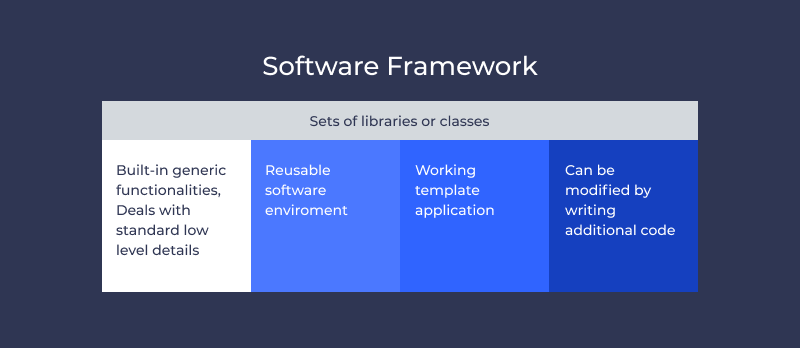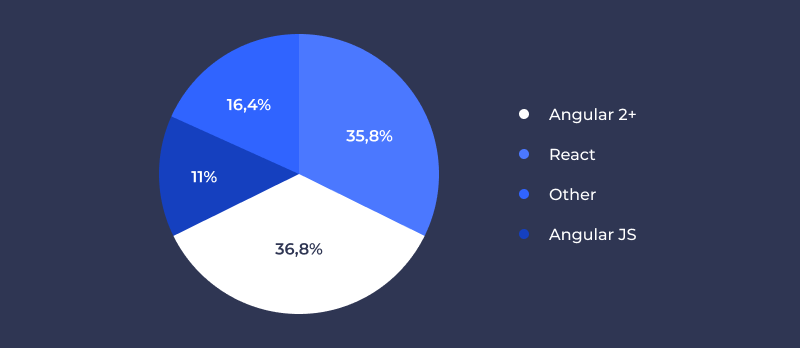Table of Contents
There are many definitions in the developer’s vocabulary, and for most users, an engineer’s lexicon can be tough to handle. There are various systems at work, countless abbreviations, and many more appear on a daily basis.
“Framework” should definitely be the one to know because it is an imperative mechanism that stands behind the processes on almost all websites, apps, extensions, programs, and other computer systems.
To be more aware of it is the best way to efficiently reach all your business objectives with the help of software. So, what is a Framework? How does it work? What do you need it for? What frameworks exist? Read on to find the answers on these and related questions.
What is the structural engineering framework?
In computer programming, a framework can be best defined as a tool which allows one to develop software and create systems. This tool itself is a set of processes which is why a framework is defined as abstraction by engineers.
And abstraction in computer programming is the process of removing spatial or temporal details. This process is similar to the generalization, meaning that it simplifies the arrangement of details, leaving only the most necessary structural things to allow the system work.
Unfortunately, that was the easy explanation. But let’s use an example. Assume you have white and brown cows, chicken, dogs and cats, cars, employees and clients. Perhaps you’re running a farm, and you need a system to track, optimize and simplify the operations.
You divide the data (for a computer, this is all data) into 3 categories: animals, people, and transport. You divide animals into cows (further divided into brown and white) and pets (dogs and cats). You divide people into employees and clients and make a separate category for transport (cars, trucks, etc). For a computer program it will look like 1, 2 and 3 (animals, people, transport). This is abstraction and now you understand that it is simplification by means of generalization.
Still have doubts? Sure, we’re only starting to warm up. Here’s a good framework definition:
Framework it`s a real or conceptual structure intended to serve as a support or guide for the building of something that expands the structure into something useful.
But, again, you won’t understand it without a good example. In engineering it is always “show, don’t tell” but it can be put into words effectively, so you could tell your friends about it.
Now, to define framework imagine that you have to cut a piece of paper with dimensions 10 by 10 inches. You would pick scissors and do just that, right? Or, it may be something more complex like a piece of paper in the form of a triangle. Still, you’d surely just get to the task right ahead. Then, suppose you are asked to cut 1000 such pieces of the same dimensions or a 1000 triangles.
What would you do? In this regard, you would definitely make a frame 5×5 inches or a triangle-shaped stencil to complete the task faster with more precision and less effort. This is what framework in programming does. It abstracts the task that is to be performed again and again and provides room for the development of applications with all the repetitive or routine operations being automatically done.

What is framework engineering used for, and how do they operate?
Frameworks are designed to save time and provide shortcuts. You can make a very simple website or a modern web app without them.
Frameworks are also similar to libraries, so some even confuse the two. Frameworks optimize the development process and allow you to use, change, and integrate code, simplifying the work. All coders know frameworks, even though they don’t always use them.
Statistically, the time spent learning how to operate a framework pays off in the end since it allows doing more in less time but with a lot more quality.
That’s because even an inexperienced programmer operating within a framework can easily integrate great code into his program. Generally, framework engineering programmers do this because for a myriad of processes, perfect code already exists.
All that’s left is to integrate it. Suppose your project needs Process A + Process B + Process C. A developer looks for the best code for each of the processes and unites them, operating within a framework.
Unlike libraries, frameworks allow the inversion of control over the code. Therefore, if you need to define what a framework is, say that it is a tool used to build applications.
However, you now understand how it is used and exactly what for (abstraction), so a clear comprehension of the process makes it easier for you to answer the question because you don’t just sound like you know or memorized the answer but because you truly know it.

The most popular frameworks
Among the most widely used frameworks that we employ in development are React, NodeJS, Angular but there are many other as well. Frameworks like Django or Xamarin are used for more nuanced development aspects on certain projects requiring a special approach.
For a variety of commercial purposes, Angular, React, and NodeJS best fit the requirements, and they streamline a lot of development mechanisms to allow continuous delivery and rapid deployment of the completed code. Frameworks optimize and speed up the whole process, especially when the tasks are repetitive from project to project.
It is not only that the framework itself is a great tool, but coupled with a skilled programmer who has experience working with it, produces magnificent outcomes.
Conclusion
Now you’re a bit smarter, aren’t you? It always feels great to know how something in programming works, even though it feels so challenging in the beginning. Writing this, I myself started to feel a little bit smarter like the first time I found out how the internal combustion engine works or why the rain falls down. Frameworks are necessary for today’s commercial software development.
If not for frameworks, developing would have taken twice as more time and even more effort, meaning additional costs for clients. Therefore, we aim to hire programmers who do well with frameworks.
FAQ
Usually, a front end developer is the one works with frameworks. A full-stack programmer can also do it and rarely a back end developer with sufficient knowledge uses frameworks.
Development team is responsible for this decision. And it depends on the complexity and scope of work.
Yes, there are, although the benefits outweigh them. Some JavaScript frameworks become outdated very quickly, and despite the fact that they save time and make development easier, the problems they may create require additional effort and time to deal with. However, that’s a frequent issue with software development in general.






